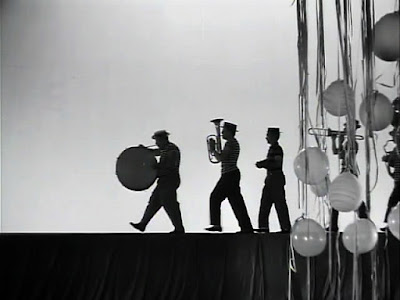'Entrei de gaiato' (My goose is cooked) is pure fun... a lot of people trying to cheat on a lot of other people while Carnaval music - especially 'Me dá um dinheiro aí' - is played from the first minute to the last.
7 February 1960 - a Herbert Richers production 'Entrei de gaiato' premieres in Rio de Janeiro; in Sao Paulo it is release on 20 February 1960. It is one of my favourite Brazilian musical comedies of all time. It is uncanny to think that the genre itself - musical comedy - was living on borrowed time. In 2 more years it would be dead altogether due to the onslaught of TV.
7 February 1960 - 'Correio da Manhã' columnist lambasts 'Entrei de gaiato': "O Carnaval, como se sabe, começa nos estúdios cariocas antes de se espalhar pelas ruas. Êsse falso Carnaval fabricado entre 4 paredes já se tornou uma tradição indesejável, rendosa por sinal, para os que antecipam a festa. Na história, que serve apenas de pretexto para que os artistas-de-radio cantem suas marchas e sambas, Zé Trindade é um vigarista que vai hospedar-se no Palácio Hotel a fim de dar um 'golpe' num ricaço qualquer. Dercy Gonçalves, acompanhada de sua sobrinha (Evelyn Rios), é uma viúva que se hospeda lá visando obter um marido para a sobrinha. Roberto Duval e Marina Marcel são ladrões internacionais dispostos a 'limpar' um paxá do Sudão. Costinha, amigo de Zé Trindade, é bell-boy do hotel, e Hamilton Ferreira e Luiz Carlos Braga os detetives da casa.
Zé Trindade (Januário Joboatão)
Dercy Gonçalves (Ananásia da Emancipação)
Costinha (Bolota, a bell-boy)
Roberto Duval (Dr. Mark, vigarista)
Marina Marcel (Anabela)
Grande Otelo
Evelyn Rios (Elisa)
Luiz Carlos Braga (Fred, hotel detective)
Hamilton Ferreira (Lucas, hotel dectective)
Milton Carneiro (Eunuco)
Francisco Anisio / Ventura Ferreira / Luiz Mazzei
Procopinho / Walter Siqueira / Mendez / Grijó Sobrinho
Aracy Rosa / Yara Lex / Chiquinho / Agnaldo Rocha
Rodolfo Carvalho / Joel da Rosa / Maria Aparecida.
6 March 1960 - J.B. Tanko's 'Entrei de gaiato' opens at Cine Bandeirantes four weeks after it premiered in Rio de Janeiro.
Dercy Gonçalves weds Zé Trindade under the eyes of bell-boy Costinha & hotel-detective Hamilton Ferreira.
Marina Marcel dances during the day and prowls the hotel at night; Evelyn Rios & Luiz Carlos Braga.
Costinha, the bell-boy from hell.
the Hotel manager summons detectives Fred & Lucas to keep an eye at 'international thieves' that are planning to rob the Pasha Shapofoka from Adis Bobô in Sudan.
Hamilton Ferreira & Luiz Carlos Braga as hotel dectectives.
Ananásia keeps her eyes on Jaboatão thinking he's a rich farmer while her niece has fun with the house-detective.
clueless hotel-detective reveals secrets to Mr Mack (Roberto Duval) who is actually one of the international thieves; Roberto Duval chats with Black-Out who's about to break out on his musical number.
after 'Maria Candelária' (1952) and 'Maria Escandalosa' (1955) comes 'Maria Brasilia'.
Vocês conhecem a 'Maria Brasilia'?
Grande Otelo welcomes the best Carnaval songs of 1960.
Alphabetically ordered by its performer here are the many musical numbers:
Aracy Costa sings 'Carnaval na lua' (João de Barro)
Black-Out warbles 'Maria Brasilia' (João Roberto Kelly-José Saccomani)
Carlos Galhardo croons 'Cachôpa' (Augusto de Oliveira-Madalena Correia)
Dercy Gonçalves wrecks 'Castigo' (Dolores Duran)
Dircinha Baptista belts out 'Meio mundo' (J.Piedade-Dora Lopes-J.Mascarenhas)
Emilinha Borba charms 'Menina direitinha' (Rutinaldo-Brasinha-Vicente...)
Gilda de Barros swings 'Tem caroço no angú' (Arthur Montenegro-Otolindo Lopes-Renato Araujo)
Grande Otelo chants 'Umbigo de vedete' (Armando Cavalcanti-Klécius Caldas)
Joel de Almeida serenades 'Linda brincadeira' (Jair Amorim-Antonio Nassara)
Linda Baptista sways 'Vai que é mole' (Haroldo Lobo-Milton de Oliveira)
Moacyr Franco shouts 'Me dá um dinheiro aí' (Ivan Ferreira-Homero Ferreira-Glauco Ferreira)
Trio Irakitan harmonize 'Caixinha do bom parecer' (Arlindo de Souza)
Zé Trindade vocalizes 'Cobra que não anda' (Walter Levita-Milton da Silva Bittrencourt)
Yara Lex sings 'Canção oriental' (Armando Ângelo) plus
Irany de Oliveira e seu conjunto Marabá.
Chiquinho, Costinha, Zé Trindade & actor-screen-writer Chico Anisio.
detective Fred tells Elisa that Argentine Anabela has been all around the world.
suddenly it dawns on him that Anabela could be one of the international thieves.
Fred finally spots Anabela climbing out of her apartment window.
Josip B.Tanko set the tone to Edward Blake's 'Pink Panther' 5 years earlier.
unsuspecting Joboatão prepares to hit the sack and hide Ananasia's jewels under the pillow.
Henry Mancini would have probably set the 'Pink Panther Theme'on these scenes...
Fred gets back into the Hotel to catch a thieve...
Fred almost catches her... but is caught himself by a treacherous blow given by her accomplice...
2nd February 1958 - Rio de Janeiro's Correio da Manhã brings a profile of Marina Marcel.
Zé Trindade's monologues were the highlights of his movies...
'Cobra que não anda não engole sapo'.
a fellow comes up to Linda Baptista and complains the girl he fancies doesn't care for him; Linda tells him: don't you worry, women are really easy (móle) and gives him a lesson on how easy women really are:
Se ela passa, pisca o olho e bóle-bóle, vai que é móle, vai que é móle; mulher é feito pudim, geléia ou rocambóle... vai que é móle (it's a cinch!).
if a girls passes by, winks an eye at you and swings her hips, you may be sure, it's a sinch! Women are like pudding, jelly, roulade... you may be sure, it's a cinch!
middle-aged, roly-poly Linda Baptista being utterly politically incorrect.




.PNG)




























































No comments:
Post a Comment